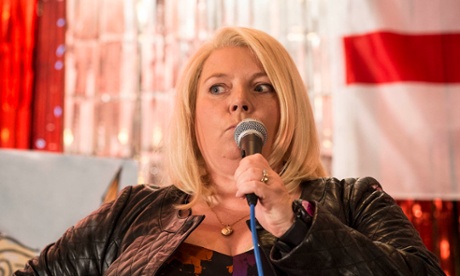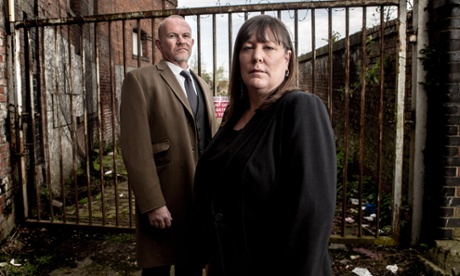
If it’s a wedding reception with swastika cupcakes, you know you’re at a Paul Abbott party. One he has written, I mean, not hosting. I’m guessing – I don’t know the man.
DCs Kowalska and Tanner are undercover at such a wedding reception as the third episode of Abbott’s latest creation, No Offence (Channel 4), opens. (And I stretched a point in the opening paragraph – this particular episode was written by Paul Tomalin, who has a fine way with words as well as with baked goods.) They are there to arrest local thug Jimmy Webb, who has just united in holy matrimony with the daughter of the local BNP-a-like gang, on suspicion of murdering Sameena, a woman from a Pakistani family, by firebombing her house. DI Deering takes the mic, a cupcake and great pleasure in pronouncing the bridegroom nicked.
But they have the wrong man. Jimmy was on his stag do on the night of the attack, getting a blow job from a black woman with “a deformity”. This turns out to be a penis. On the upside, the cupcakes at his next bash could be hilarious.
Meanwhile, the ongoing investigation into the serial killer of young women with Down’s syndrome reveals that the first victim, Lucy, had a boyfriend. Her drama teacher knew about him but didn’t tell the police for fear that he would lose his job for not protecting her, even when two more girls were murdered. “You’d better be carrying that guilt like cancer till you croak,” says Deering, a magnificent line magnificently delivered.
The episode is a riot – almost literally so once Sameena’s husband and killer starts swearing jihad after his attempts to frame Jimmy for her murder fail – and flashes by so brightly and at such speed that the closing moments bring you to a halt so suddenly you fear whiplash. The police station administrator, whose main job is to keep Deering informed of internecine politics and media developments (“Can you not just text me this shit?”) is just bundling a drunk out of the waiting area when she stumbles across the father of one of the young women from Lucy’s drama group. He is waiting – patiently, disbelievingly – to report his daughter missing. Suddenly the noise and heat and sweary mirth desert us and it’s just him, staring into the void and the police putting down their pints in the pub as their phones go off, and heading back to work.
It was almost as chilling and moving as the real thing, which unfolded over on BBC1 with the final episode of the three-part documentary The Detectives. This has followed Manchester police’s Serious Sexual Offences Unit as they have investigated, alongside their usual workload, the multiple historical offences alleged against Jimmy Savile’s former flatmate and chauffeur Ray Teret. The final episode concentrated on the eight-week trial – the boxes of evidence and paperwork delivered to court, the checking and re-checking of statements, the visits and phone calls to the 17 witnesses victimised 30 or 40 years ago in their teens who have already done so much and now need to do even more, managing their tension and their fear and their grief as the weeks in court and then of jury deliberations roll on.

It was a finely judged and unsensationalist record of just one of the ugly, gnarled branches of Operation Yewtree. Witness Kathy was abused by Teret when she was less than 14, raped when she was little older than that. Ellie was 15 when he gave her a lift to her dance class and then told her she couldn’t leave the car until she made him feel better. Two stories, representative of a number you can only guess at.
Against that monumental backdrop, other more quotidian but no less depressing stories played out. Five new rape cases arrive in a week. Conflicting accounts of an alleged rape of a drunk woman outside a nightclub led to a not-guilty verdict. “The conviction rate is something like 10%,” said detective sergeant Mark Tiffany. “That means, nine out of 10 times, the job you’re doing is not going to end up with a guilty verdict … That frustrates me.” The closest you get to a break in the clouds is when a DNA sample in a case Mark has been working on for a year, the violent rape of a 17 year old by a stranger, finally yields a suspect and a name. “That’s why we do what we do,” says Mark, with no trace of pride or arrogance. “It’s important.”
Teret was sentenced to 25 years. But he wasn’t convicted on all counts. Kathy got her guilty verdict. Ellie did not. It’s not the truth courts are after, you see, but evidence. And so the world turns.
• This article was amended on 20 May 2015 to remove incorrect information in relation to one of the cases in The Detectives.






